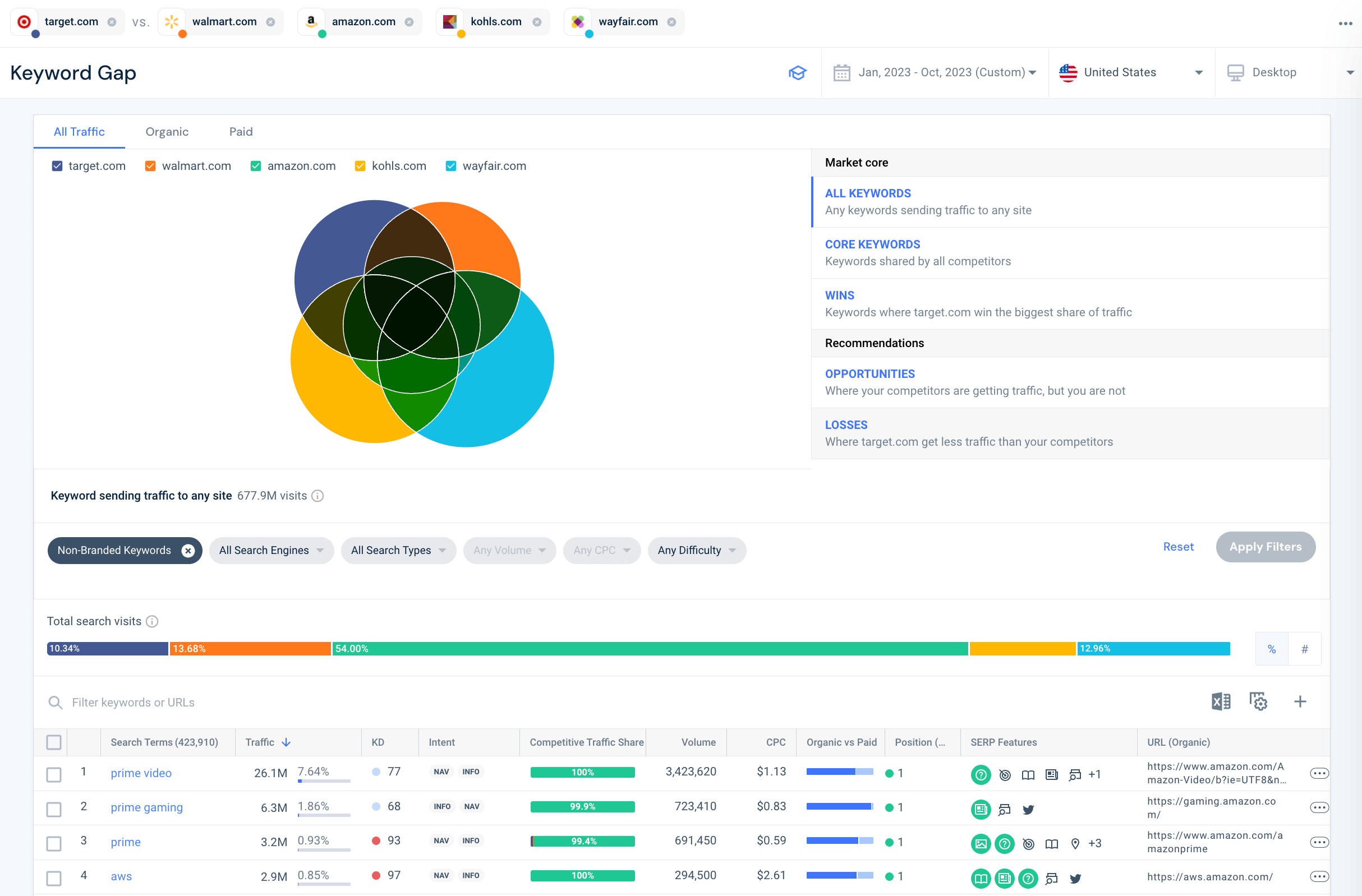How to Steal Your Competitors’ Organic Traffic

We all want what we can’t have. But what if, in this case, you can have it.
Stealing your competitors’ organic traffic and making it your own is, in fact, possible. But to steal it, you need to find out the keywords your competitors are gaining the traffic from. What are people searching for to land on their websites?
Spoiler alert: Similarweb reveals all that, and more.
Here’s how to steal your competitors’ organic traffic in 5 easy steps, using Similarweb.
How to steal your competitors’ organic traffic
1) Find your top 5 competitors
The first step of the process to finding what keywords your competitors are targeting is to ask yourself: Who ARE my competitors on organic search?
Sure, you can type in a few search terms onto Google and see who comes up, but if you want a more universal view of your organic competitors – the ones that appear for multiple core search terms for your business, and across the different geographies – you want digital data.
You never know, you might find you were focusing on the wrong competition all along.
Using Similarweb’s ‘Organic Competitors’ report, taking target.com as an example, we can see a few more online marketplaces contending with Target.com’s organic traffic, as well as:
- Search overlap scores
- Shared keywords
- Total website traffic
- Industry
The search overlap appears to decline as the industry becomes more specific than simply ‘marketplace’ where you’ll find everything from your evening meal to your next big piece of tech.
2) Discover your competitors’ top-performing pages
Which of your competitors’ pages are getting the most traffic via organic search? Similarweb’s got a trick for that:
Looking at the past year, these Target pages have been a big hit with US traffic. Out of the top 15, they are mostly branded keywords (which shows great brand awareness), apart from ‘ps5’. With a current keyword difficulty of 80, Target has evidently gained authority as a marketplace for popular technology.
Let’s pretend that Target is your direct competitor – how could you use this information to steal or win back that organic traffic? Ask yourself questions like:
- Do my subdomains and category pages include the right keywords?
- Is my website fully optimized for events like Black Friday?
- Does my website have a help section to provide answers and help to my users?
- Do the landing pages match up to the keywords getting users there?
Using Organic Pages, you can also filter the Newly Discovered and Trending pages to see where your competitors’ marketing strategies are moving over time.
3) Reveal your competitors’ hot topics
The organic pages that get the most traffic give you an idea of what your competitors cover in their content and marketing, and what they do well from. However, you want to – and can – dive deeper than that by finding out specific topics that do well (and when).
The tool we use to do that is Keyword Phrase, and we’ll take a non-branded term as an example, ‘careers’. It’s a broad search term, but Target has seen a 1.03% traffic share – this is out of the whole US market.
Use the comparison feature to see how you or multiple competitors perform against each other. Here, you can see Walmart takes the majority (65.3%) of the competitive traffic share for this shared keyword.
Determining who, out of your competitors, is winning the traffic share for the keywords you both want and need as a business, means you can understand:
- Where the keywords send users
- What content is attracting the users
- How your competitor is promoting for this
By comparing multiple competitors and selecting non-branded keywords, you can quickly see the topics that everyone is talking about, along with the competitive traffic share.
Take your pick of the main topics that appear in this view and consider how to incorporate them into your marketing strategy or optimize your current content. In this example, you could reconsider your categories like Video, Gaming, and Music, as well as how you promote your product as a gift.
4) Locate the impactful keywords
From the most popular pages on search to the topics they’re on, and now to the organic search terms and keywords that inspire your content strategy and get users to read your content.
If we say it’s as simple as one click, would you believe us? Because you should.
Looking at the selection of topics above, let’s select ‘gaming’ to see what exactly these contenders are talking about.
The beauty of Keywords on Similarweb is that it not only gives you everything you need to know about a keyword (you know, the traffic behind it, the keyword difficulty, search intent, volume, CPC, and so on), but also the SERP features identified for the specific keyword.
Another very quick, very easy way to see the keywords you’re missing out on, is the Keyword Gap tool. Whether you prefer a visual or a (downloadable) list, use filters to refine your search to see what will push your strategy further.
See who’s sharing your keywords, winning the SERP features currently, and get yourselves inspired, then…
5) Optimize and adapt your organic strategy
… use that inspiration to build on your own organic search strategy.
Analyze the quality of your competitors’ content – perhaps you’ll spot your competitor has a specific tone of voice, enticing metadata, an interactive tool, a partnership with a big brand or influencer.
Use these findings to create content that’s 10x better than your competitors’.
Here are a few ways you can do that:
- Add missing sections that can be valuable to the readers
- Make sure you’re answering your target audiences’ question queries
- Include external links and internal links to support your content and build authority
- Don’t forget featured snippets, and schemas that can increase your click-through rate
- Monitor and regularly update and optimize your website content
This will all have a positive effect on the quality of content – and Google rewards quality content.
The moral of the story? Get stalking, get stealing, get optimizing – and don’t stop monitoring.
Spot the keywords, steal the traffic with Similarweb
If having the tools to 1) see what your search competitors are up to, 2) steal their organic traffic, 3) win more keywords, and 4) win more traffic and conversions as a result sounds good to you, an all-in-one marketing tool like Similarweb is the one for you.
But don’t take our word for it. Try Similarweb for free, today.
FAQs
How can I improve my website’s organic traffic?
Competitor research and looking into their strategies to gain organic traffic is an underestimated way to win more on search.
What can I learn from my competitors to improve my organic traffic?
Analyzing competitors can provide you with valuable insights, including their content strategies, target keywords, and learning from their successes and shortcomings to optimize your own approach.
Should I focus on specific keywords to improve organic traffic?
Yes, targeting relevant keywords is crucial. Conduct thorough keyword research to identify terms your audience is searching for, and optimize your content accordingly to increase visibility in search results.
The #1 keyword research tool
Give it a try or talk to our marketing team — don’t worry, it’s free!















